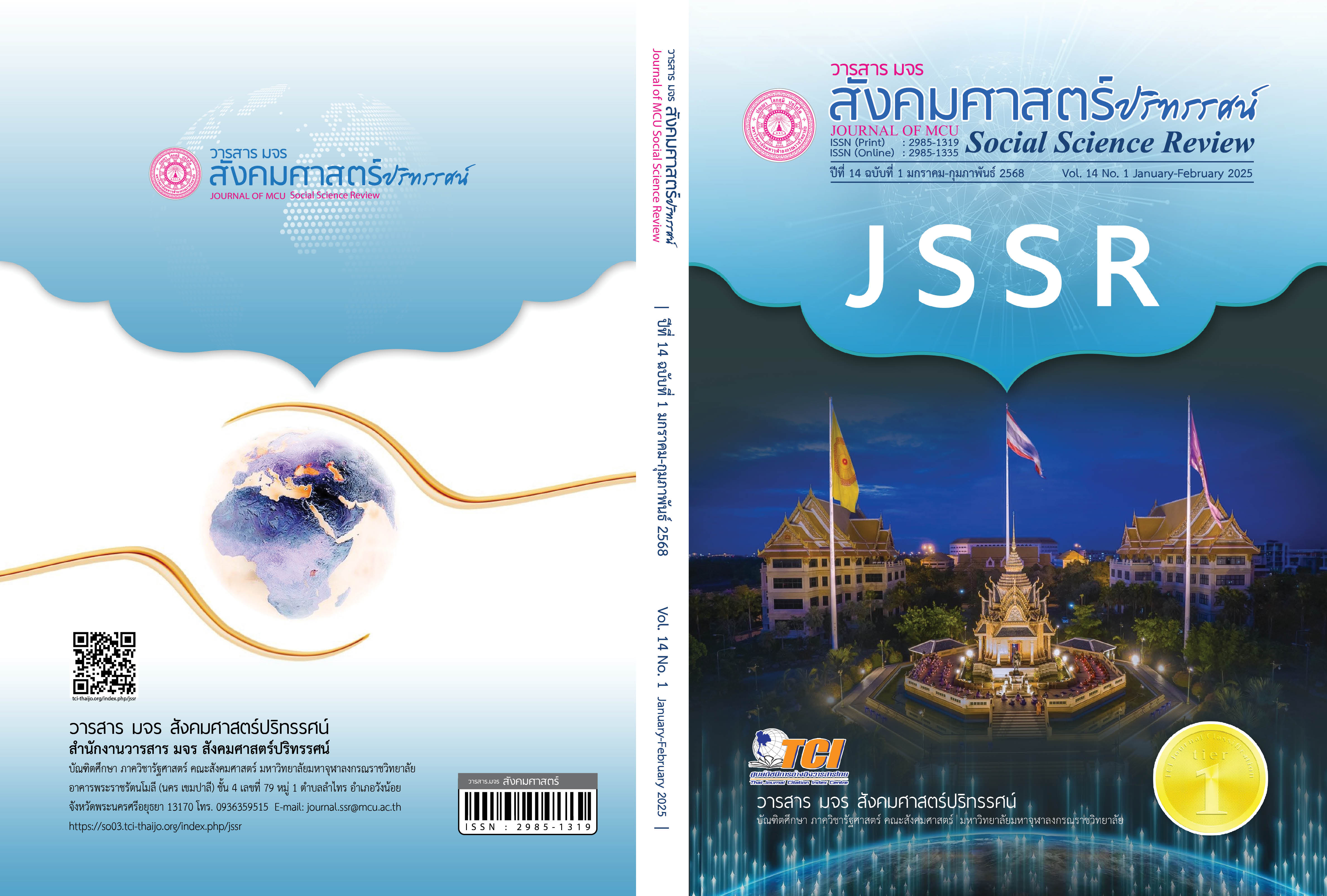การพัฒนาแพลตฟอร์มเครื่องมือการวัดประเมินผลการเรียนรู้ สำหรับการเรียนรู้ฐานสมรรถนะ
คำสำคัญ:
แพลตฟอร์ม, เครื่องมือการวัดประเมินผลการเรียนรู้, การเรียนรู้ฐานสมรรถนะบทคัดย่อ
บทความวิจัยนี้วัตถุประสงค์ 1. ออกแบบและพัฒนาแพลตฟอร์มเครื่องมือการวัดประเมินผลการเรียนรู้สำหรับการเรียนรู้ฐานสมรรถนะ และ 2. ทดลองใช้แพลตฟอร์มเครื่องมือการวัดประเมินผลการเรียนรู้สำหรับการเรียนรู้ฐานสมรรถนะ กลุ่มตัวอย่างแบ่งเป็น 2 กลุ่ม ได้แก่ กลุ่มผู้สอนจำนวน 400 คน จากโรงเรียนนำร่องในจังหวัดปทุมธานีที่ จำนวน 300 คน และจากผู้สอนในระดับอุดมศึกษามหาวิทยาลัยราชภัฏ จำนวน 100 คน และกลุ่มผู้เชี่ยวชาญ จำนวน 5 คน เครื่องมือที่ใช้ในการวิจัย ประกอบด้วย 1. แพลตฟอร์มฯ 2. แบบประเมินคุณภาพแพลตฟอร์มฯ 3. แบบสอบถามความพึงพอใจและความคิดเห็น และ 4. แบบประเมินประสิทธิภาพของแพลตฟอร์มฯ วิเคราะห์ข้อมูลโดยใช้ ค่าเฉลี่ย และค่าส่วนเบี่ยงเบนมาตรฐาน
ผลการวิจัยพบว่า 1. แพลตฟอร์มเครื่องมือการวัดประเมินผลการเรียนรู้สำหรับการเรียนรู้ฐานสมรรถนะ ได้รับการพัฒนาแพลตฟอร์มที่ https://evapowertool.com/ ประกอบด้วย เนื้อหา 4 หัวข้อ ได้แก่ 1. การรู้เกี่ยวกับการวัดผลและประเมินผลการเรียนรู้สำหรับการเรียนรู้ฐานสมรรถนะ 2. เครื่องมือการวัดผลและประเมินผลการเรียนรู้สำหรับการเรียนรู้ฐานสมรรถนะ 3. แหล่งเรียนรู้เพิ่มเติม และ 4. สื่อเพิ่มเติม มีคุณภาพแพลตฟอร์มฯ โดยรวมอยู่ในระดับมากที่สุด 2. ผู้สอนมีความพึงพอใจและความคิดเห็นต่อแพลตฟอร์มฯ อยู่ในระดับมากที่สุด และผู้เชี่ยวชาญมีความคิดเห็นต่อประสิทธิภาพของแพลตฟอร์มฯ อยู่ในระดับมากที่สุด
เอกสารอ้างอิง
กระทรวงการอุดมศึกษา วิทยาศาสตร์ วิจัยและนวัตกรรม. (2562). พระราชบัญญัติการอุดมศึกษา พ.ศ.2562. กรุงเทพฯ: รับส่งสินค้าและพัสดุภัณฑ์.
ณัฐวดี กูละพัฒน์ และสิรินาถ จงกลกลาง. (2565). การจัดการเรียนรู้ฐานสมรรถนะเพื่อพัฒนาผลสัมฤทธิ์ทางการเรียนและทักษะการคิดอย่างมีวิจารณญาณสำหรับนักเรียนชั้นมัธยมศึกษาปีที่ 4. วารสารราชพฤกษ์, 20(1), 59-70.
ดรุณี ปัญจรัตนากร และคณะ. (2565). ระบบบริหารจัดการเรียนรู้เชิงปฏิบัติการร่วมกับการเรียนรู้แบบใช้ปัญหาเป็นฐานเกี่ยวกับการจัดการนวัตกรรมและเทคโนโลยีทางการศึกษาสำหรับผู้เรียนระดับบัณฑิตศึกษา. วารสารการศึกษาและนวัตกรรมการเรียนรู้ มหาวิทยาลัยสงขลานครินทร์, 2(2), 167-188.
ดรุณี ปัญจรัตนากร และคณะ. (2566). การพัฒนาแพลตฟอร์มการจัดการเรียนรู้ออนไลน์เกี่ยวกับการจัดการฐานข้อมูลโรงเรียนสมัยใหม่โดยใช้เทคนิคการเรียนรู้แบบใช้กิจกรรมเป็นฐาน สำหรับผู้เรียนระดับบัณฑิตศึกษา. คุรุสภาวิทยาจารย์, 4(1), 87-104.
ประพาพร มั่นคง และมานิตย์ อาษานอก. (2559). การประเมินประสิทธิภาพ และการศึกษาความพึงพอใจต่อระบบสารสนเทศเพื่อการติดตามวิทยานิพนธ์ คณะศึกษาศาสตร์ มหาวิทยาลัยมหาสารคาม. วารสารการวัดผลการศึกษามหาวิทยาลัยมหาสารคาม, 22(1), 183-190.
ปัณฑ์ชณิช เพ่งผล และพงษ์ศักดิ์ ผกามาศ. (2565). การพัฒนาแพลตฟอร์มการเรียนการสอนออนไลน์เกี่ยวกับความมั่นคงปลอดภัยเครือข่ายโดยใช้เทคนิคการจัดการเรียนรู้แบบห้องเรียนกลับด้านสำหรับผู้เรียนระดับปริญญาตรีคณะเทคโนโลยีสารสนเทศ. วารสารวิจัยรำไพพรรณี, 16(1), 106-117.
ปิ่นทอง ทองเฟื่อง และธวัชชัย สหพงษ์. (2558). การพัฒนาแอปพลิเคชันบนแอนดรอยด์ เรื่องรักสุขภาพ. มหาสารคาม: มหาวิทยาลัยราชภัฏมหาสารคาม.
พงษ์ศักดิ์ ผกามาศ และคณะ. (2564). การพัฒนาแพลตฟอร์มการจัดการเรียนรู้เชิงรุกโดยใช้แนวคิดคอนสตรัคติวิสต์เกี่ยวกับระบบไอซีทีและนวัตกรรมเพื่อการบริหารการศึกษาสำหรับนิสิตระดับบัณฑิตศึกษา. วารสารการศึกษาและนวัตกรรมการเรียนรู้ มหาวิทยาลัยสงขลานครินทร์, 1(3), 219-237.
ศิรชญาน์ การะเวก. (2562). การประเมินประสิทธิภาพระบบสารสนเทศในการให้บริการนักศึกษาของมหาวิทยาลัยในกำกับของรัฐ กรณีศึกษา: กรุงเทพมหานคร. วารสารวิชาการเฉลิมกาญจนา, 6(2), 69-81.
ศิริชัย กาญจนวาสี. (2543). การเรียนรูที่เน้นผู้เรียนเปนศูนย์กลาง. กรุงเทพฯ: จุฬาลงกรณ์มหาวิทยาลัย.
สมบูรณ์ ตันยะ. (2545). การประเมินทางการศึกษา. กรุงเทพฯ: สุวีริยาสาสน์.
สำนักงานเลขาธิการสภาการศึกษา. (2563). การจัดการเรียนรู้ฐานสมรรถนะเชิงรุก. กรุงเทพฯ: บริษัท 21 เซ็นจูรี่จำกัด.
สิรินาถ จงกลกลาง. (2564). การออกแบบการเรียนรู้ตามแนวทางการจัดการศึกษาที่เน้นผลลัพธ์การเรียนรู้สู่สมรรถนะ. นครราชสีมา: มหาวิทยาลัยราชภัฏนครราชสีมา.
สุทธิพงษ์ อุพลเถียร และคณะ. (2560). การประเมินประสิทธิภาพระบบสารสนเทศเพื่อการบริหารของมหาวิทยาลัยการสาธารณสุขสิรินธร จังหวัดขอนแก่น. วารสารสถาบันวิจัยพิมลธรรม, 4(1), 73-84.
Adnan, M. & Anwar, K. (2020). Online Learning Amid the Covid-19 Pandemic: Students' Perspectives. Journal of Pedagogical Sociology and Psychology, 2(1), 45-51.
Azorín, C. (2020). Beyond covid-19 supernova. Is another education coming?. Journal of Professional Capital and Community, 5(3/4), 381-390.
Best, J. W. (1977). Research in Education (3rd ed.). New Jersey: Prentice Hall.
Dar, W. A. (2021). Pedagogy for its Own Sake: Teacher’s Beliefs about Activity-based Learning in Rural Government Schools of Kashmir. Quality Assurance in Education, 29(2/3), 311-327.
Dhawan, S. (2020). Online Learning: A Panacea in the Time of Covid-19 Crisis. Journal of Educational Technology Systems, 49(1), 5-22.
Ismaili, Y. (2021). Evaluation of Students’ Attitude Toward Distance Learning During the Pandemic (Covid-19): A Case Study of ELTE University. On the Horizon, 29(1), 17-30.
Sankaranarayanan, S. et al. (2020). Designing for Learning During Collaborative Projects Online: Tools and Takeaways. Information and Learning Sciences, 121(7/8), 569-577.
Walton, J. (2017). Competency-Based Education: Definitions and Difference Makers. Retrieved May 9, 2024, from https://shorturl.asia/dl1wN
Zainuddin, Z. & Perera, C. J. (2018). Supporting students’ self-directed learning in the flipped classroom through the LMS TES Blend Space. On the Horizon, 26(4), 281-290.
ดาวน์โหลด
เผยแพร่แล้ว
รูปแบบการอ้างอิง
ฉบับ
ประเภทบทความ
สัญญาอนุญาต
ลิขสิทธิ์ (c) 2024 วารสาร มจร สังคมศาสตร์ปริทรรศน์

อนุญาตภายใต้เงื่อนไข Creative Commons Attribution-NonCommercial-NoDerivatives 4.0 International License.
เพื่อให้เป็นไปตามกฎหมายลิขสิทธิ์ ผู้นิพนธ์ทุกท่านต้องลงลายมือชื่อในแบบฟอร์มใบมอบลิขสิทธิ์บทความให้แก่วารสารฯ พร้อมกับบทความต้นฉบับที่ได้แก้ไขครั้งสุดท้าย นอกจากนี้ ผู้นิพนธ์ทุกท่านต้องยืนยันว่าบทความต้นฉบับที่ส่งมาตีพิมพ์นั้น ได้ส่งมาตีพิมพ์เฉพาะในวารสาร มจร สังคมศาสตร์ปริทรรศน์ เพียงแห่งเดียวเท่านั้น หากมีการใช้ภาพหรือตารางหรือเนื้อหาอื่นๆ ของผู้นิพนธ์อื่นที่ปรากฏในสิ่งตีพิมพ์อื่นมาแล้ว ผู้นิพนธ์ต้องขออนุญาตเจ้าของลิขสิทธิ์ก่อน พร้อมทั้งแสดงหนังสือที่ได้รับการยินยอมต่อบรรณาธิการ ก่อนที่บทความจะได้รับการตีพิมพ์ หากไม่เป็นไปตามข้อกำหนดเบื้องต้น ทางวารสารจะถอดบทความของท่านออกโดยไม่มีข้อยกเว้นใดๆ ทั้งสิ้น





